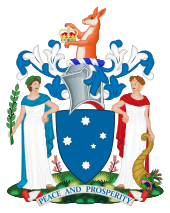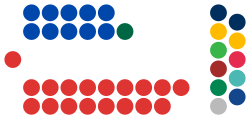Legislative Council of Victoria
| Legislative Council | |
|---|---|
| 58th Parliament | |
 |
|
| Type | |
| Type | |
| History | |
| Founded | 1851 |
| Leadership | |
|
Bruce Atkinson, Liberal
Since 21 December 2010 |
|
|
Gayle Tierney, Labor
Since 23 December 2014 |
|
|
Leader of the Council
|
Gavin Jennings, Labor
Since 23 December 2014 |
|
Leader of the Opposition
|
Mary Wooldridge, Liberal
Since 17 December 2014 |
|
Cesar Melhem, Labor
Since 23 December 2014 |
|
|
Wendy Lovell, Liberal
Since 23 December 2014 |
|
| Structure | |
| Seats | 40 |
 |
|
|
Legislative Council political groups
|
Government Labor (14) Opposition Liberal (14) National (2) Crossbench Greens (5) Shooters, Fishers, Farmers (2) Sex (1) Democratic Labour (1) Vote 1 Local Jobs (1) |
| Legislative Council committees |
Standing Committees
Domestic Committees
|
| Elections | |
|
Last general election
|
29 November 2014 |
|
Next general election
|
November 2018 |
| Meeting place | |
 |
|
| Legislative Council Chamber, Parliament House, Melbourne, Victoria, Australia |
|
| Website | |
| Vic Legislative Council | |
Standing Committees
Domestic Committees
The Victorian Legislative Council (VLC) is the upper house of the bicameral Parliament of Victoria, Australia; the lower house being the Legislative Assembly. Both houses sit at Parliament House in Spring Street, Melbourne. The Legislative Council serves as a house of review, in a similar fashion to its federal counterpart, the Australian Senate. Although it is possible for legislation to be first introduced in the Council, most bills receive their first hearing in the Legislative Assembly.
The presiding officer of the council is the President of the Legislative Council. The council presently has 40 members serving four-year terms, elected from eight electoral regions each with five members. With each region electing 5 members, the quota in each region for election, after distribution of preferences, is 16.7% (one-sixth).
The separate colony of Victoria was proclaimed on 1 July 1851 and writs for the election of the first Legislative Council were issued at the same time for the 20 elected members. The Legislative Council initially consisted of 30 members, 10 of which were nominated by the Lieutenant-Governor and 20 were elected from 16 "electoral districts", with Melbourne electing 3 members, and Geelong and the county of Bourke electing 2 members each. The electors were male British subjects over the age of 21 years, who owned freehold valued at £100 or a householder paying rent of £10 per year, both very large sums at the time. Members of the Legislative Council were unpaid, further restricting participation of those without independent means. It took some time before the Legislative Council was elected and ready to sit. The Legislative Council met for the first time in November 1851 at St Patrick's Hall, which had been built in 1847 in Bourke Street, Melbourne. The Legislative Council sat there until the opening of the Parliament House in 1856. James Frederick Palmer was the presiding officer of the Council, then called speaker.
...
Wikipedia
